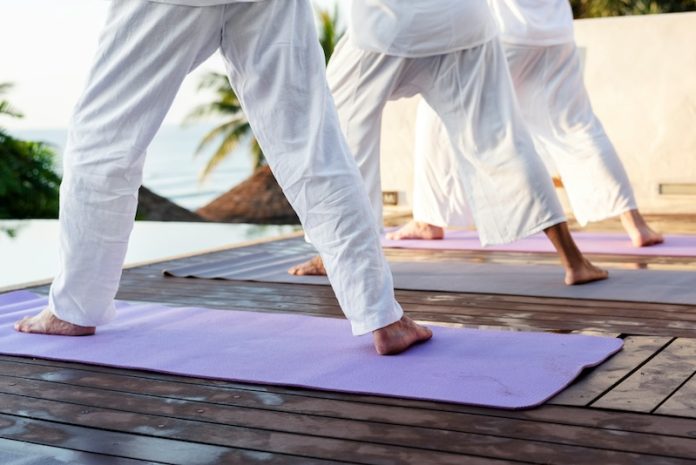
Chronic knee pain can make staying active a challenge, but regular exercise is one of the best ways to reduce pain, improve mobility, and maintain overall health.
The key is choosing low-impact workouts that are gentle on the joints while still providing strength and flexibility benefits.
Research shows that these types of exercises can significantly improve quality of life for people with knee pain without worsening their symptoms.
Swimming and water-based exercises are often recommended for people with chronic knee pain. The buoyancy of water reduces pressure on the joints, allowing you to move freely without pain.
A study published in Arthritis Research & Therapy found that water aerobics improved knee function and reduced pain in people with osteoarthritis. Swimming laps or participating in aqua fitness classes can help strengthen the muscles around the knee while providing a full-body workout.
Walking is another excellent low-impact option. While high-impact activities like running can strain the knees, walking at a moderate pace is gentle and effective.
Research in The Journal of Physical Therapy Science showed that regular walking improved joint mobility and reduced stiffness in people with knee pain. For added support, walking on softer surfaces like grass or using walking poles can help reduce the impact on your knees.
Cycling, whether on a stationary bike or outdoors, is a great way to strengthen the muscles around the knee without putting too much pressure on the joint itself.
A study in Clinical Rehabilitation found that cycling improved pain and function in patients with knee osteoarthritis. Keeping the seat height adjusted properly ensures that your knees don’t bend too much, which can prevent additional strain. Cycling is also an excellent way to boost cardiovascular fitness.
Yoga and tai chi are mindful movement practices that can help improve flexibility, balance, and strength while reducing knee pain. Yoga poses like Child’s Pose or Cat-Cow stretch the muscles gently and improve circulation to the knees.
Tai chi, with its slow and controlled movements, has been shown in studies to reduce knee pain and improve physical function. Research in Annals of Internal Medicine found that tai chi was as effective as physical therapy for knee osteoarthritis.
Strength training can also be adapted for those with knee pain. Building the muscles around the knee, such as the quadriceps and hamstrings, can provide better joint support and reduce strain.
Resistance bands or light weights are great tools for strengthening these muscles without overloading the joint. A study in The Journal of Strength and Conditioning Research showed that targeted strength training reduced knee pain and improved mobility over time.
Pilates is another effective low-impact workout that focuses on core strength and muscle alignment. Pilates exercises often involve lying on your back or using equipment like a reformer to perform controlled movements, making it easier on the knees.
Studies have found that Pilates can improve joint stability and reduce pain in people with chronic knee issues.
Stretching is a crucial part of any low-impact workout routine. Gentle stretches for the calves, hamstrings, and quads can improve flexibility and relieve tightness around the knee joint.
Adding a few minutes of stretching before and after exercise can prevent stiffness and keep your knees feeling their best.
If you’re new to exercise or worried about worsening your knee pain, it’s a good idea to start slowly and listen to your body.
Consulting with a physical therapist or fitness professional can help you design a safe and effective workout plan tailored to your needs. They can also teach you proper techniques to avoid strain.
Staying active with chronic knee pain might seem intimidating, but low-impact workouts offer a way to keep moving without discomfort.
Whether you prefer water exercises, yoga, or cycling, incorporating gentle movement into your routine can strengthen your knees and improve your overall well-being. With patience and consistency, you can take control of your knee pain and stay active for years to come.
If you care about bone health, please read studies that plant-based diets can harm your bone health without these nutrients, and this bone problem may strongly increase COVID-19 death risk.
For more information about wellness, please see recent studies that too much of this vitamin may increase your risk of bone fractures, and results showing this type of exercise may protect your bone health, slow down bone aging.
Copyright © 2024 Knowridge Science Report. All rights reserved.



